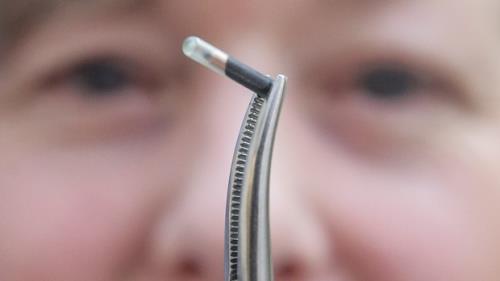Microchips promise ethical minefield
19 April 2017

One very recent development is that several companies have started microchipping their employees.
While this futuristic development has real benefits, it's a case of the good news and the bad news, like most things in life.
Swedish start-up hub Epicenter began implanting workers in January 2015 and now about 150 workers are microchipped.
A company based in Belgium also offers its employees such implants, and there are isolated cases around the world of tech enthusiasts trying micro-chips out in recent years.
The microchips are the size of a grain of rice. The syringe slides in between the thumb and index finger of the recipient.
Then, with a click, a microchip is injected into the employee's hand. The microchips function as swipe cards: to open doors, operate printers or buy smoothies with a wave of the hand.
The microchips are similar to those used for dogs or tracking courier deliveries.
The microchips use near-field communication technology, the same as in Paywave credit cards or mobile payments.
But unlike company swipe cards or smartphones, which can generate the same data, people cannot easily separate themselves from the chips.
In addition to the convenient uses of the microchips, they could also be used to tell the employer what time you come to work, what time you leave, when you take toilet breaks and for how long.
The microchips could even gather data while you're not at work, telling your employer where you go and what you do in your personal time.
Perhaps the greatest concern would be hackers gaining access to the huge amount of information available through this technology.
How do we as a society get the benefits of this technology without intruding into areas that each individual is entitled to keep private?
This is the challenge.
With regard to employment, it is unlikely that an employer could require its employees to be microchipped.
Forcing employees to be microchipped would go beyond the level of control that an employer has over an employee.
While employees must follow lawful and reasonable instructions, a directive to get a microchip would certainly not be accepted as lawful and reasonable in New Zealand in 2017.
However, if an employer made getting microchipped a term of an employment contract that prospective employees had to agree to, it would be a different story.
The Bill of Rights Act protects the right to refuse to undergo medical treatment.
However, while it is conceivable that medical data could be collected through the microchip, it does not combat a disease or disorder and it would be a stretch to classify the microchips as 'medical treatment'.
The Privacy Act would provide some protection.
The Act prevents information from being collected by means that are unlawful, unfair or unreasonably intrude upon the individual's personal affairs.
Getting a microchip would be intrusive, however, if you agreed to getting microchipped in your contract your consent overrides this.
Even so, under the Act employees could require their employer to give them access to personal information collected from microchips.
The employer would be prohibited from using the information for a purpose other than the one for which it was collected and there would be significant restrictions on the employer sharing the information with anyone else.
The employer would also be required to have reasonable security safeguards against hackers or the misuse of information.
Employees should also be aware that the data collected from micro-chips could be used to their detriment, such as for disciplinary action.
In a recent Employment Relations Authority decision, a manager suspected an employee of abusing the flexibility his employer allowed him. The manager decided to secretly follow the employee for a day recording his activities and the times.
Later that day the employee was told to fill in a call sheet for the day and return it after the weekend which he did.
Needless to say the call sheet did not match the manager's observations. The manager called the employee to a meeting and asked him to confirm the call sheets were "true and correct".
The employee was then given the manager's list of times and activities recorded during the surveillance and asked him to explain four discrepancies. The employee was issued with a written warning for dishonesty.
The Employment Relations Authority decided that, rather than following the individual around the city, a better approach would have been to make enquires on the day their suspicions were aroused.
They could have checked what he said against other staff with whom he worked that day.
The Authority concluded that the company did not sufficiently investigate the allegations, raise its concerns with the employee, and give him a reasonable opportunity to respond to those concerns.
The company was ordered to treat the employee as never having received the warning, and pay him $7500 compensation for distress.
In this case the employee did not consent to the manager following him and conducting surveillance.
Employees that elect to have the microchip implanted have arguably consented to being surveilled.
At present our laws would not adequately cater for the complexities and ethical minefield of this new level of surveillance.
It is likely that before it became common to micro-chip employees, legislation specifically dealing with the new technology would be enacted.
After all, allowing your body to be monitored 24/7 would be a big price to pay for the convenience of not using a swipe card.


